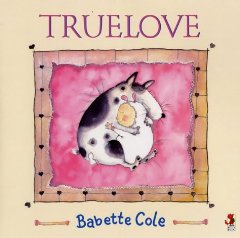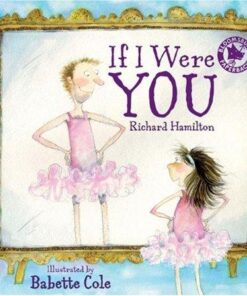Truelove
Author: Cole, Babette
Reading Age: 4 to 5 Junior Infants, 5 to 6 Senior Infants
Publisher: Red Fox
Illustrator: n/a
ISBN-13: 9780099433057
Number of pages: 40
From the Publisher
Truelove’s wet, lovable nose is out of joint. The cause? A new baby has arrived in the house. Truelove tries his best to attract his owners’ attention, but fina... Read more
€7.99 Original price was: €7.99.€7.00Current price is: €7.00.
Only 2 left in store

From the Publisher
Truelove’s wet, lovable nose is out of joint. The cause? A new baby has arrived in the house. Truelove tries his best to attract his owners’ attention, but finally gives up and leaves home. Soon he falls into bad company and is forced to return shamefaced. His owners are delighted to see him–and his slightly dodgy new friends, of course.
Aphorisms about love are illustrated by events in the little dog’s life – sometimes ironic, sometimes sincere, but always hilarious.
Publishers Weekly
Truelove, the neglected pooch of new (human) parents, joins a pack of runaway hounds. PW said, ‘Busy families may cast a guilty eye toward their loyal pets; displaced older siblings will relate to Cole’s generous, and not at all misnamed, hero.’ Ages 4-8. (Dec.) Copyright 2003 Reed Business Information.
Publishers Weekly
Cole (The BAD Good Manners Book) turns greeting-card sentiment inside out in this pictorial tale of Truelove, a lonesome dog whose owners dote on their new baby. Syrupy captions about caring, offset by miniature hearts, contradict images of Truelove groveling for attention and being ignored. Under the platitude ‘Love cures all hurt,’ Truelove holds up an injured paw; in the next image, he licks his wound while the new parents tend the infant in the background. To show that ‘Love makes your heart sing,’ Truelove howls, ‘I Loo… Ve yooou… Wooo! Wooo! Wooo!’ and gets banished to the rainy front stoop: ‘That’s it, Truelove. Out!’ The poignant situation becomes a dire emergency when Truelove joins a pack of runaway hounds. Luckily, his masters rescue him and his friends from the pound, and Truelove has no hard feelings (‘Love means forgiving’). Cole tells the story in scraggly, anti-cute watercolors, with italicized asides from the dog, and she lets irony accumulate in the mawkish definitions of unconditional love. Like William Steig’s Made for Each Other, this list of cliches ends on a realistic note. The conclusion (‘Sometimes love isn’t easy, but there’s always enough to go around’) is not framed by whimsical hearts, and the picture shows Truelove changing the smiling baby’s diaper. Busy families may cast a guilty eye toward their loyal pets; displaced older siblings will relate to Cole’s generous, and not at all misnamed, hero. Ages 4-8. (Jan.) Copyright 2001 Cahners Business Information.
Children’s Literature
When a new baby arrives at pooch Truelove’s home, life becomes difficult for him. Put outside when his behavior is misunderstood, Truelove gets into trouble when he takes up with a scruffy bunch of renegade dogs. Meanwhile, his master and mistress realize how much they miss him. Fortunately, love shines through, and ‘there’s always enough to go around.’ Told in brief sentences on alternating pages, Truelove’s profound thoughts about love in dialog with the family are amusingly tongue-in-cheek. Full-page watercolor drawings, sometimes framed and heart-decorated, provide the lighthearted context for the frantic actions. Cole creates personalities that generate smiles; her anthropomorphic canines are right at home with the scatty humans. As he hugs the baby on the jacket/cover, Truelove can steal your heart. 2001, Dial Books for Young Readers/Penguin Putnam, $15.99. Ages 4 to 8. Reviewer: Ken Marantz and Sylvia Marantz
School Library Journal
K-Gr 2-A dog must teach its family that there is enough love to go around when a new baby arrives. On double-page spreads, platitudes like ‘Love means sharing’ face hilarious illustrations of the consequences, such as Truelove offering a mouse to the baby. ‘Love makes your heart sing’ shows the pooch belting out ‘I Loo-ve yooou-Wooo! Wooo! Wooo!’ and then being ushered out the door by the frazzled parents, infant screaming. Chock-full of Cole’s humor and trademark cartoons, the story shows that love really does conquer all. It’s all very funny, but adults are likely to appreciate the humor much more than children will. Rosemary Wells’s McDuff and









